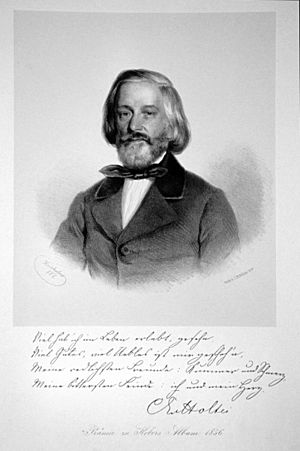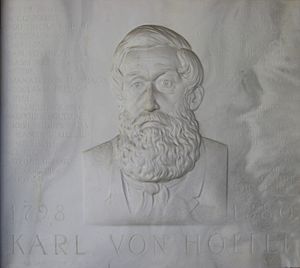Karl von Holtei facts for kids
Karl Eduard von Holtei (born January 24, 1798 – died February 12, 1880) was a German poet and actor. He was known for his plays, poems, and for being a great reciter of other people's works, especially Shakespeare's plays.
Contents
Early Life and Career Beginnings
Karl Eduard von Holtei was born in a city called Breslau. His father was an officer in the Hussars, a type of cavalry soldier. In 1815, Karl joined the Prussian army as a volunteer.
After his time in the army, he started studying law at the University of Breslau. However, he was very interested in the stage and soon left his studies. He made his first appearance as an actor in Breslau.
For the next two years, Karl traveled around. He didn't act much, but he became known for reciting his own poems. In 1821, he married an actress named Luise Roge. He then became a theatre-poet for the Breslau stage.
Life in Berlin and New Plays
Later, Karl and Luise moved to Berlin. Luise had a job at the Court theatre there. During this time, Karl wrote two popular short plays called Die Wiener in Berlin (The Viennese in Berlin) and Die Berliner in Wien (The Berliners in Vienna). These plays were very popular back then.
Sadly, Luise died in 1825. After her death, Karl started working at the Königsstädter theatre in Berlin. He wrote more plays, including Lenore (1828), which was based on a famous poem, and Der alte Feldherr (The Old General) (1825).
In 1830, Karl married another actress named Julie Holzbecher. She worked at the same theatre. They performed together in Darmstadt. When they returned to Berlin in 1831, Karl wrote the words for an opera called Des Adlers Horst (The Eagle's Nest) (1832). He also wrote a play called Der dumme Peter (Silly Peter) (1837).
Traveling and Later Years
In 1833, Holtei went back to acting and toured with his wife. They visited many important cities like Hamburg, Leipzig, Dresden, Munich, and Vienna. In Vienna, people were amazed by his ability to recite, especially when he performed parts of Shakespeare's plays. He became so famous that he was made the manager of the Josefstädter theatre in Vienna.
Even though he was very successful, Holtei left Vienna in 1836. From 1837 to 1839, he managed a theatre in Riga. His second wife, Julie, died there. After that, he traveled around Germany, giving recitals. He also had a short job in Breslau.
In 1847, he settled in Graz. There, he focused on writing novels. Some of his novels include Die Vagabunden (The Vagabonds) (1851), Christian Lammfell (1853), and Der letzte Komödiant (The Last Comedian) (1863).
Karl von Holtei spent his last years in Breslau. He was not wealthy, so he found a home in a monastery called Kloster der Barmherzigen Brüder. He passed away there.
His Legacy
Karl von Holtei is known for bringing a type of play called the vaudeville to Germany. As an actor, he was able to truly show the characters he played. But he was best known for reciting. Many people said he had no rival when it came to reciting Shakespeare.
A writer named August Lewald once said that Holtei could make his audience understand his ideas with his strong poetic and dramatic skills. He added that he had never heard anyone else speak with such power in Germany.
Holtei was not just a playwright; he also wrote beautiful poems. Some of his famous poetry collections include Schlesische Gedichte (Silesian Poems) (1830) and Gedichte (Poems) (1861). He also wrote an interesting book about his own life called Vierzig Jahre (Forty Years) (1843-1850).
See also
 In Spanish: Karl von Holtei para niños
In Spanish: Karl von Holtei para niños



